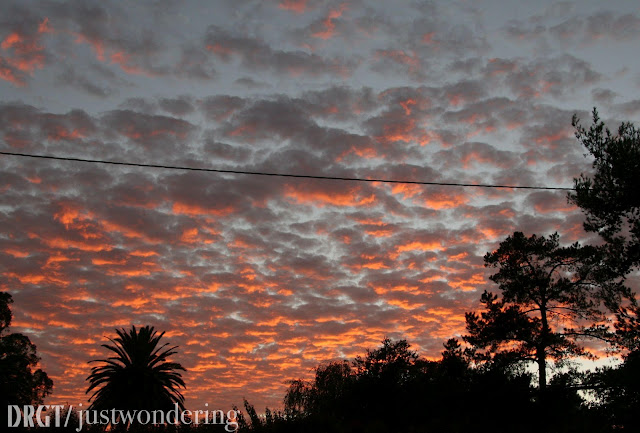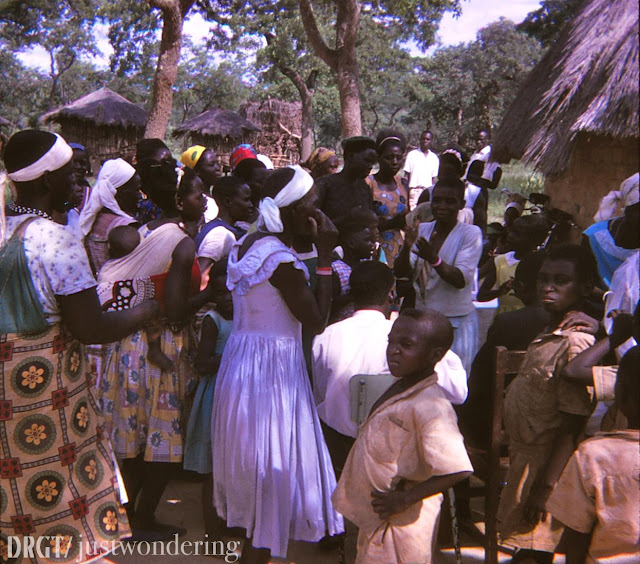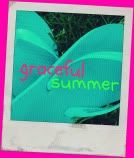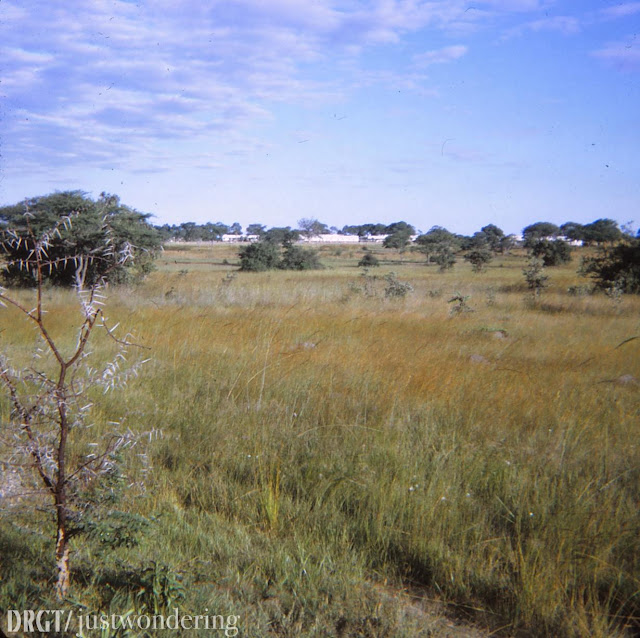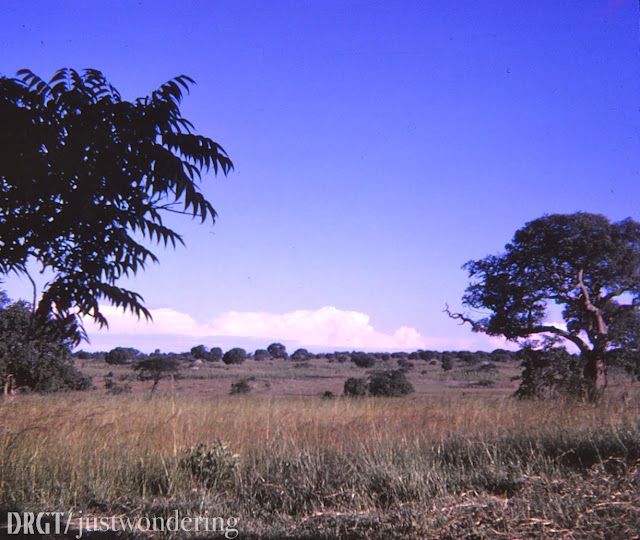Quiet for the Weekend – September 7-9, 2012
An African Journey: Post Four – An African Wedding
one of my husband’s oldest friends and his wife stood in line, shook our hands, wished us well, and jokingly said,
Finding out that they were thinking about
And we got to see some gorgeous country in the process.
An African Journal – Post Three: A Living Landscape
An African Journey – Post Two: A Letter to My Younger Self…
That’s what you are, you know. You don’t realize that, but I do. Looking back across these years, I see you. I see how very young you are. Twenty-one, newly married, recent college graduate, thrilled to be living your life, to be planning a cross-continental move, to be moving on, moving out, moving away.
You’re a little bit full of yourself and your university education, especially those three courses in African studies you took that last semester, in preparation for moving across the sea. Three college level courses does not an expert make – believe me, it just does not. But then, you learned that within the first six weeks of moving there, didn’t you? Yes, you learned it the hard way. I guess that’s how all good learning comes, sweetheart. It has to hurt a little to be real.
I look at these old pictures and I know you’re a bit nervous about all that’s happened to you in the last few months. I see a smidgen of uncertainty, a frisson of anxiety. But mostly what I see when I look at your face is this wonderful truth: you are just plain gob-smacked with the freedom you’ve found in being married.
You and he are on your own – and that feels grand, doesn’t it? You can go anywhere, do anything, be anyone. Of course, there are limits to that, aren’t there? Limits of morality and common decency, which you both hold in high regard. But more than that, there are limits of believing and belonging, limits that you share, that you value, that you try to live.
Following in the footsteps of the Rabbi from Nazareth has always been part of who you are, for as long as you can remember. Suffering growing pains as a 4-year-old, you told your Mama one night, “That ol’ Jesus is down in my leg tonight and he’s hurtin’ me!” And you believed that with your whole, small heart. Jesus was there, living your life with you.
And walking down that center aisle of the old brownstone church in downtown Los Angeles, late on a Sunday evening the year you turned 11 – saying ‘yes’ to Jesus in front of your community of faith – that was important, significant. And you felt it deep down inside you as you drove home in the backseat of your parents’ car, staring at the street lights. You were filled with wonder that night – and so many nights since.
Your heart was true that 21st year, this much I know. But I also know that your heart and your mind had a lot of traveling to do in order to communicate well. And then there was the matter of getting what you knew and what you felt to travel down your limbs to your hands and feet. Living what you knew, what you believed, what you began to allow yourself to feel with the truer pieces of yourself – that took years and years, and still isn’t done. No, not done yet.
But here’s what I want to tell you, oh, brave younger self. Here’s how I want to encourage you. You will break out of the mold as you get older and wiser. And you will make a lot of mistakes in that process. But you will also learn and stretch and grow and change and enlarge your heart and your mind and your spirit . . . and it will be wonderful. Difficult, painful, anxiety-filled, marked by loss, watered by tears and tears and tears . . . but wonderful.
You will push three living beings out into the world and love them fiercely. Those three will form you in ways you cannot even begin to imagine now, but count on it – their mark on you will be indelible.
And while you’re at home, raising them and learning more about that Rabbi you love, you will begin the hard work of questioning much of what you were taught about who you are as a daughter of God, a sister to Jesus. And you will find answers from good people, from faithful people, people who’ve walked the road ahead of you. Some of them will be contemporaries; many will be much older saints, long gone to be with Jesus.
If you could see me across these years, you might be surprised, maybe even shocked. Life has this way of getting both more complicated and more simple as time passes. Layer upon layer of love and responsibility get added as your family and friendships grow. But at the same time, much that is extraneous and unnecessary gets stripped away, leaving the bare bones beauty of truth, faith, hope, peace, love.
You cannot see what’s ahead – neither the joy nor the heartbreak. And you can’t really see what’s behind you at this point, either. That takes time and work and self-care and you’re nowhere near that at age 21. You’re too busy living your life to look at it carefully. Give it a little time, however. You’ll start looking. And what you’ll find will surprise you, bring you to tears, fill you with thanksgiving and make you wonder about a lot of things.
It will take time and scrutiny to understand the impact of an alcoholic grandfather on your mother and her parenting of you. It will take time and patience to look at the steely-eyed pressure your grandmother put on your father and how his reaction to that made a difference in you and your own family circle growing up. These things take time, they take maturity. But you’ll get there. You’ll always be getting there, honey. Count on it.
Because that’s what this life is about. Truly, it is. We’re here to become human, to become the person we were designed and created to be – in a word, to look more and more like Jesus. And back then, you only had glimpses of all that, which was exactly how it should have been. Now, at this end of these years, I can say with gratitude that goes deep as the Marianas Trench – it’s all grace. Because it is, dear one. It is.
Love you – more and more,
Your older, wiser, creakier Self
Garden Glory: Summer Weekend – August 10-12
Glauco Ortolano
2 Thessalonians 2:15-16, The Message
What Does It Mean to Be Blessed? Reflections on a Life
My mother-in-law, Kathryn Trautwein, with my mother, Ruth Gold. Picture taken at Easter 3 years ago. Today they are 96 and 91 years old.
skirt length, sleeve length,
I had come to serve with people
who looked and lived so dramatically differently
from anyone I had ever before encountered
in my Christian life.
one where the entire backyard was a swimming pool.
one house we were looking at over another.
Joining with Em’s synchro-blog today. You can find other entries here:
http://www.emilywierenga.com/2012/08/what-it-means-to-be-blessed-synchroblog.html
Also with Ann and her gratitude linky:
Quiet for the Weekend: July 6-8, 2012
‘Arise, my darling, my beautiful one,
the cooing of doves is heard in our land.
Arise, come, my darling;
Sunny Summer Afternoon: A Photo Essay
“This Difficult Friendship” – Living in Bodies
for a group of middle-aged guys I’ve seen here before,
at home they are
aimed at bolstering our self-esteem.”
The gift of my Creator?
My body.
The embodiment of God’s dream for me
A reflection of the God who loves me.
Play me a song.
Lead me, I am yours.
I cannot dance alone.
And at the middle of the week, also joining Ann V., Jennifer Dukes Lee and Emily W.





